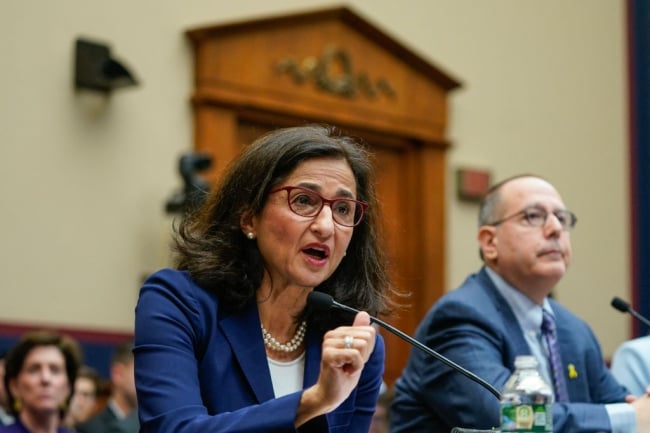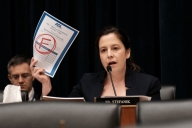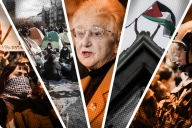You have /5 articles left.
Sign up for a free account or log in.

In a high-stakes testimony before Congress, Columbia President Minouche Shafik condemned antisemitism and denounced the words of some faculty members.
Photo by DREW ANGERER/AFP via Getty Images
Columbia University President Minouche Shafik carefully and repeatedly condemned antisemitism over the course of a nearly four-hour appearance before Congress on Wednesday. She denounced the speech and actions of some pro-Palestinian professors and student protesters. She made clear under questioning that she considers the oft-changed slogan “From the river to the sea, Palestine will be free” to be antisemitic, though she noted that other people don’t hear it as such.
But judging from the responses she received from Republicans on the House education committee, none of that might be enough to keep Shafik or Columbia—or its faculty members—from further Congressional scrutiny.
“We’re deeply disturbed by what we’re seeing at Columbia and many of the things we’re hearing in today’s hearing,” Representative Virginia Foxx, the North Carolina Republican who chairs the House Education and Workforce Committee, said after all the questions, answers and statements were done. “While some changes have begun on campus, there is still a significant amount of work.”
The contentious hearing didn’t deliver any immediate viral “gotcha” moments for conservative critics to pounce on, as Shafik seemed unfazed by sharp and adversarial questions about her decisions on disciplining students and faculty and enforcing campus policies on demonstrations. She repeatedly pointed to actions the university has taken—suspending students, investigating faculty members and updating policies—as proof that her administration is committed to protecting Jewish students.
“I want to reassure you that I have no hesitation in enforcing our policies,” Shafik said. “When I first started at Columbia, our policies, our systems and our enforcement mechanisms were not up to the scale of this challenge. They were designed for a very different world. They were designed for a student cheating on an exam.”
Even so, eliminating what she and other witnesses called “an ancient hatred” is not something Columbia can do on its own or overnight, Shafik told the committee. “The ultimate answer to antisemitism in all its forms is education, and we should not lose sight of the powerful impact of our core mission.”
In addition to questions about students, Republicans homed in on specific Columbia faculty members who’ve attended rallies critical of Israel and made statements in support of Hamas after the attack on Israel. They grilled Shafik on whether those professors were disciplined and if they are still teaching on campus. Shafik condemned all the statements referenced at the hearing and said that some of the faculty members in question were under investigation—one of whom said, after the hearing, that this was "news" to him.
‘Nice to Have Them Side With Us’
Shafik did not sit alone as she faced her skeptics. She was joined at the witness table by Claire Shipman and David Greenwald, the co-chairs of Columbia’s Board of Trustees, as well as Columbia Law School Professor David Schizer, co-chair of the university’s antisemitism task force.
Before them, the chamber was filled to the brim throughout the much-anticipated hearing, with public guests and press members occupying every chair in the audience and congressional staffers lining the walls. More than a dozen Jewish students from Columbia took their seats early, while those who represented pro-Palestinian groups were shut out and left in the hallway. They could be heard chanting “let us in,” and “let us hear the president speak” from inside the room.
The Jewish students in the hearing room provided commentary speaking quietly among themselves and reacting as their president and trustees faced tough questions from lawmakers. During a break in the hearing, one student said to another, “we don’t frequently have people on our side, so it’s nice to have them side with us.”
This marked the second time in five months that Foxx had brought in representatives from elite universities to be scolded and pressed for answers about their responses to antisemitic incidents on campus. Unlike the infamous December hearing that led to the resignations of the presidents of Harvard University and the University of Pennsylvania, Republicans had materials to draw on as they developed their questions. The committee has been investigating antisemitism at Columbia since February and has thus far received 4,000 documents.
The documents, along with the hearing’s sole focus on Columbia, gave lawmakers and the witnesses the chance to dig into how exactly the university is working to address antisemitism. That worked to Columbia’s advantage, said Jon Fansmith, senior vice president of government relations and national engagement at the American Council on Education.
“It was a comprehensive look into their capabilities and what their limitations are,” he said. “I hope the public watched that and saw that this is being addressed … You can’t come away from that and say that Columbia doesn’t take it seriously.”
Fansmith added that the Columbia officials were prepared to tell the story of what they were doing and to acknowledge where they failed, which made a difference in the hearing.
“They clearly understood that they were at a Congressional hearing,” he said.
In a sign that Shafik and the other witnesses learned from the December hearing, they all gave emphatic answers to what was an expected question: Does calling for the genocide of Jews violate Columbia’s code of conduct? All four said “Yes, it does,”—a change from December, when the presidents hedged and said the answer depended on the context.
Still, that answer didn’t entirely mollify Republicans.
“You’ve been able to condemn antisemitism without using the phrase, ‘it depends on the context,’ but the problem is action on campus doesn’t match your rhetoric today,” said Florida representative Aaron Bean, a Republican. “This once prestigious university’s reputation is going down the toilet because of all the antisemitism that’s flourishing on campus.”
Spotlight Hits Columbia Faculty
Representative Tim Walberg, a Michigan Republican, was the first of several lawmakers to single out Joseph Massad, a tenured Columbia professor, by name as part of what became a throughline in the hearing. Massad, a professor in Middle Eastern, South Asian and African studies, wrote in the immediate aftermath of the Oct. 7 Hamas attack that it was a “resistance offensive” and “awesome.”
Walberg and others said Massad has made anti-Israel and Jewish statements for years, and questioned what Shafik was doing about his recent statements. “I’m appalled by what he’s said,” Shafik answered. “He has been spoken to.”
“He’s been spoken to?” Walberg shot back. “So support of terrorism is acceptable if you’re a Columbia professor?”
Shafik wasn’t given a chance to directly respond, but said later in her testimony that when faculty behave in any discriminatory fashion at Columbia, there are consequences, and she said that Massad no longer has a leadership role on campus. Massad has chaired an academic review panel in the College of Arts and Sciences this academic year.
Walberg then asked Shipman and Greenwald whether they would still vote to give Massad tenure. Both said they wouldn’t.
“Why is he still in the classroom?” Walberg asked. “You are trustees of this preeminent institution, of diversity, of free thought and you talk to professors who made horrific statements like this? And I could’ve addressed professors. You in fact pointed out that there are numerous professors that you are looking at right now. If they are only going to get a talking to, I’m concerned.”
Later in the hearing, Shafik said that Massad is under investigation. Massad told The New York Times that the investigation was “news to me.”
Shafik also said that Katherine Franke, a law professor, was under investigation for making discriminatory remarks. Lawmakers quoted Franke as saying that “all Israeli students who have served in the [Israeli Defense Forces] are dangerous and shouldn’t be on campus.”
“She has been spoken to by a very senior person in the administration, and she has said that that was not what she intended to say,” Shafik said of Franke. “I think she will be finding a way to clarify her position.”
Mohamed Abdou, a visiting scholar hired after the Oct. 7 attack, was singled out as well. New York representative Elise Stefanik, a Republican, said that Abdou posted on social media Oct. 11, “I’m with Hamas and Hezbollah and Islamic Jihad,” and questioned why Abdou was hired at all.
Shafik said the university needs to improve its vetting processes in hiring—and that Abdou was on his way out.
“I share with you your repugnance at those remarks,” she said. “He is grading his students’ papers and will never teach at Columbia again.”
In another theme that ran through the hearing, Republicans on the committee weren’t satisfied with Shafik’s responses, and wanted harsher consequences for these faculty members.
“With the lack of enforcement, you see the concern that speaking to these professors is not enough and it’s sending a message across the university that these antisemitic statements from … professors in the classroom is tolerated,” Stefanik said.
Irene Mulvey, president of the American Association of University Professors, said on social media after the hearing that academic freedom includes the right to free speech.
“When faculty speak as citizens, they should be free from institutional censorship or discipline,” Mulvey wrote. “Shafik’s public naming of professors under investigation sets a dangerous precedent [and] echoes McCarthy era cowardice.”
After her testimony and a review of the initial reactions, it appears that Shafik might avoid the intense personal and professional attacks that Harvard and Penn leaders received after their hearing in December. But some Columbia professors, it seems, might get a taste of it.

.png?itok=rRo53ZFC)





